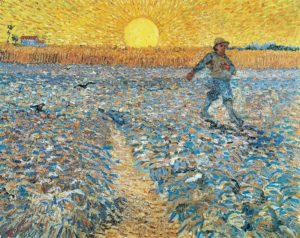Selections from Preface and Introduction to the Dordrecht Confession (1632), translated by Irvin B. Horst, in Confessions of Faith in the Anabaptist Tradition: 1527-1660
Anabaptist confessions typically followed categories similar to other Reformation-era confessions, covering issues of Christology, salvation, baptism, sin, and so forth. But it is the impetus for this confession which draws our attention. In 1586, Thomas Byntgens (a member of the Flemish Anabaptists) had purchased a house in dubious circumstances, leading to a dispute which drew in groups of Anabaptists from across Holland into the dispute. Nearly fifty years later, with the two groups having hardened into two different confessional groups, leaders from the divided groups met, and issued this preface and introduction, emphasizing the way in which public professions of faith and peacemaking go hand in hand: for the Anabaptists to credibly speak to its well-known peace witness, it must reconcile its own history.
**
Mindful and peace-loving reader, seeker after happiness and truth, we hear daily of some persons who are not favorable to our peace agreement. Failing to comply with the nature of love, which sees the best in everything, they do not speak well of it. Thereby they cause innocent and unlearned persons—who regrettably at times are more impressed by men of today than by the teaching and life of our Saviour Jesus Christ and his beloved apostles—to shy off and to turn away from it. These opponents not only reject us but also the peace so highly commended by the Son of God and his apostles. They do not obey; it seems, the exhortation of Christ: “Blessed are the peacemakers: for they shall be called the children of God,” (Mat. 5:9)…
Brethren, we along with our elders and ministers (unworthy as we are) of the united church of God here in Dordrecht; also, we, the undersigned elders, ministers, and brethren—who as co-workers were invited, delegated, and came, each for himself and for his church—are gathered in the Lord’s name in the church at this place and are one with it: wish heavenly wisdom, divine enlightenment from the almighty, eternal, and incomprehensible God for all churches, coworkers, brethren, and partakers of our common Christian faith in all towns and places where this—our brotherly union, appeasement, and agreement—will be presented and read. May this divine wisdom enable you to test, discern, and pursue what is necessary for our common peace and mutual improvement. Such peace is pleasing to God, agreeable to men, and enables us to walk as becomes our calling. In order that we and you with us after this life, along with all God’s chosen, holy, and beloved saints, may be eternally saved through our Lord Jesus Christ. To this end, may the kind and faithful God help us and grant his gracious blessing to make you and us worthy and acceptable. Amen.
Further, this must be mentioned: it is public knowledge for quite some time in many or at least some place that for various reasons an unhappy contention leading to confusion—yes, even separation and schism—rose and continue among fellow believers of the same persuasion and brotherhood of faith. Not the least among these contention was the division of the House-Buyers which continued for many years. As a result of this and all that developed from it, God’s worthy name was slandered and disgraced, and the church became an object of reproach and contempt. Along with this there was much giving and taking of offense as well as provocation and insult, especially int eh church at Franeker but also elsewhere. One might well lament such matters with regret and remorse and wish they had never happened. Mistakes are usually better seen and discerned afterwards than before as is the case with these contentions. The more one considers, especially with an impartial mind, the stronger one is convinced that the cause as well as the unfortunate results cannot entirely be laid at the feet of one side. Both sides have been greatly at fault; both have been overzealous and immoderate in the use of discipline, of rejection and separation from each other.
Both sides lacked a recognition of love as principal garb and characteristic of the true followers of Christ. Love is the sum of the great commandments, the fulfillment of the law (Jn 13:35). Love is indeed the bond of perfection; it binds believers in a harmonious relationship with the Lord; it binds believers as one heart and soul to each other in peace and unity. As members of one body, they are closely related to each other at all times and in every way: to bear and forgive the shortcomings of each other (Lk. 6:365), to cover the failures of neighbors. They deal gently with each other, showing compassion and mercy; they do not increase the hurt of the injured nor oppress or reject the weak. Instead each esteems the other person more than himself, and in this way the weaker members receive attention and respect. Indeed, love was too much lacking on the part of both sides and much unhappiness, strife, and contention were the result.
If this bond of love becomes weak and cold—or actually broken by many—the enemy sows tares in the hearts of many dozing members, which take root in bitterness (Heb. 12:15). All kinds of confusion and error result and bear fruit such as envy, discord, backbiting, hate, and strife. As a tiny spark, if it is fanned and not extinguished in time, can cause great destruction so it has gone in this matter. Also, one may truthfully say that not the House-Buyers only, nor only the results of this affair and all that was attached to it, but much rather the sins of both sides should be acknowledged as contributing to the cause of the contention….
And so both sides assembled here in the Lord’s name (unworthy as we were) in love and friendship. Insofar as it was fitting, we have spoken about and discussed these matters in the fear of the Lord. After this we turned to prayer and supplication, for which the Lord had prepared our hearts so that we were inclined towards each other. For this be the praise and thanksgiving only to him. Unshackled, free, and unbound as we had now been made, with sincere confession of guilt in regard to the matter mentioned above, we also set free and unbound all those whom we and our former leaders, together with the congregations, had bound, banned, or burdened in any way….




